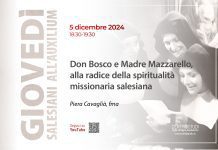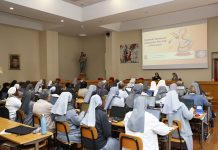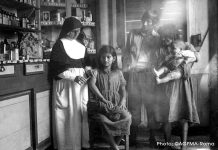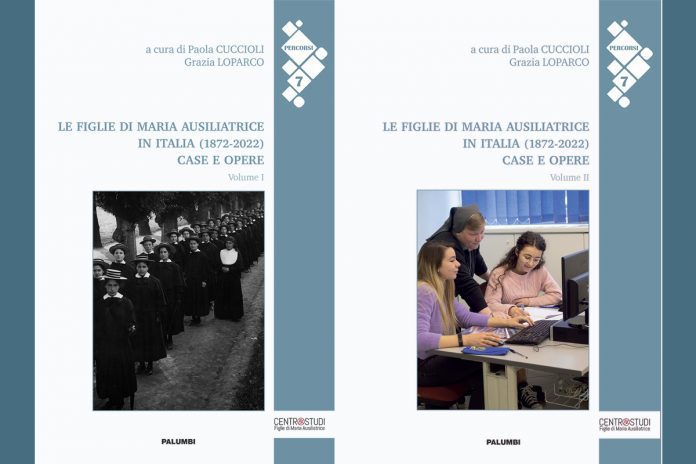Rome (Italy). The Daughters of Mary Help of Christians in Italy (1872-2022). Houses and works, is the title of the two volumes published in Teramo in March 2023 in the Paths series of the Study Center on the FMA, at the Palumbi publishing house.
Two volumes of about 1400 pages, outline the activities carried out in 1173 religious houses/communities, with tens of thousands of entries indicating the works developed by the religious in Italy in 150 years, from 1872 to 2022. The houses are divided according to the regions of Italy, which follow one another in chronological order of first foundation: Piedmont, Liguria, Sicily in the first volume; followed by Veneto, Lombardy, and all the other regions, except Molise, in the second volume.
The publication, edited by Paola Cuccioli and Grazia Loparco, Daughters of Mary Help of Christians, is the result of multi-year research by seven FMA, members of the Association of Curators of Salesian History (ACSSA) Italy: Paola Cuccioli (Piedmont, Valle d’ Aosta); Maria Stella Calicchia (Liguria, Emilia Romagna, Tuscany); Loredana Corazza (Lombardy); Bruna Calgaro (Veneto, Trentino Alto Adige, Friuli Venezia Giulia); Claudia Daretti (Lazio, Marche, Umbria, Abruzzo, Sardinia); Lucia Vizzi (Campania, Puglia, Basilicata, Calabria); Carmela Maria Coniglione (Sicily).
This is the completion of a previous research of 2011 by Grazia Loparco and Maria Teresa Spiga, Women in education. The Daughters of Mary Help of Christians in Italy (1872-2010). Documentation and essays, Rome, LAS 2011.
There, the fundamental data of all the Houses founded in Italy from 1872 to 2010 was recorded, with the statistics relating to all the professed FMA distributed by region of origin and by decade, as well as to the FMA who died or left the Institute, again by decades, and indicated by region. Furthermore, numerous denominations relating to the works were reported, collected in 11 macro-categories, from the more explicitly educational ones, such as those of education declined in all variables, up to the works created to respond to temporary emergencies (wars, emigrations, natural disasters …).
The collection of data relating to the works had taken place for the round years of the decade (1880, 1890, 1900, etc.), therefore the changes and continuity for the intermediate years of the decade were missing. For this reason, the need was felt to complete the work, specifying the duration of each work in each House, taking into account that each Community was engaged in various formative activities.
A meticulous survey thus now delivers to the reader a very wide range of activities that from north to south have followed the evolution of the country, placing itself from the perspective of educational needs referred above all to the female youth groups of the popular classes. Names and dates are more than numbers, as they bear the educational choices matured over time.
In each House, a scenario opens up to be contextualized, and so in the works of each region, of each period, or it can be studied in the socio-cultural and economic complexity, as well as of religious and educational institutions. The modules illustrate the way in which the commitment to form “good Christians and honest citizens” has been declined in a changing, non-homogeneous society.
The main source of data was the annual series of General Lists of the Institute of the Daughters of Mary Help of Christians, selecting Italy. Approximately 14,000 Italian religious took turns in the houses and works, in addition to those who left for foreign missions.
While the research constitutes a unicum in the bibliography of religious institutes in Italy, for the ad intra knowledge of a religious Institute and its widespread roots in the territory, at the same time it attests how the Salesian spirit participates in the life of the Country with the intention to foster its transformation through the education of young people.
In the Presentation, Mother Chiara Cazzuola highlights its value, “This collection adds a note of historical beauty to the celebration of the 150th anniversary of the foundation of the Institute of the Daughters of Mary Help of Christians because, through the statistics of the works and communities, it traces the history of the development of the Salesian charism in Italy. […] Reading the text, we will realize that we are not faced with cold statistical data, but with a reality that speaks of life and passionate fidelity to the Charism. The importance of this careful research is as great as the responsibility of each person who feels called to be present and a protagonist of the story”.




















